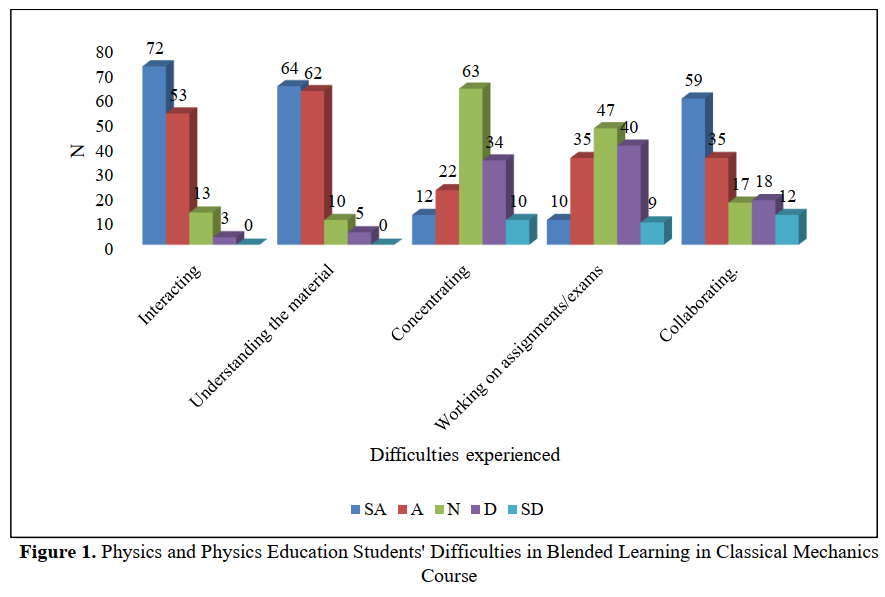Analysis of Student Learning Difficulties in Blended Learning in Classical Mechanics Course
https://doi.org/10.63081/uejtl.v1i2.32
Learning difficulties, Blended learning, Classical mechanics
Abstract
This study aims to identify the difficulties experienced by students in Classical Mechanics lectures using blended learning. The research was designed using descriptive quantitative. This research was conducted at one of the Universities in East Java, on 67 Physics Students and 74 Physics Education Students. Data collection techniques were in the form of a closed questionnaire using a Likert scale with five answer options, namely strongly agree (SA), agree (A), neutral (N), disagree (D), and strongly disagree (SD) and equipped with an open questionnaire containing written questions which were then analyzed quantitatively. The results showed that students still experienced difficulties in attending lectures using the blended learning method.
References
K. A. Karl, J. V. Peluchette, and N. Aghakhani, “Virtual Work Meetings During the COVID-19 Pandemic: The Good, Bad, and Ugly,” Small Group Research, vol. 53, No. 3, pp. 343-365, 2022, doi: 10.1177/10464964211015286
R. Sunasee, “Challenges of Teaching Organic Chemistry during COVID-19 Pandemic at a Primarily Under graduate Institution,” J. Chem. Educ., vol. 97, no.9, pp. 3176-3181, 2020.
L. X. Lim, P. E. Lim, S. H. Lim, Y. X. Lim, and A. G. Oktaviandra, “ Hi, Let's Meet Online! A Study of Virtual Meeting Platforms During the Pandemic,” Asia Pasific Journal of Management and Education (APJME), vo. 5, no. 1, pp. 126-140, 2022.
W. Zhang, “ Review of Blended Learning Definitions,” in Proceedings of the 2021 5th International Seminar on Education, Management and Social Sciences (ISEMSS 2021), vol. 571, pp. 300-303, 2021.
A. Sewang, “Blended learning effect towards Indonesian education students' learning achievement,” JPPI (Jurnal Penelitian Pendidikan Indonesia), vol. 8, no. 1, pp. 161-169, 2022.
M. Nashir, and R. N. Laili, “Hybrid Learning as an Effective Learning Solution on Intensive English Program in the New Normal Era,” IDEAS Journal of Language Teaching and Learning, Linguistics and Literature, vol. 9, no. 2, pp. 220-232, 2021.
N. E. Sidabalok, and A. Y. Sinaga, “Blended Learning Model During Covid-19 Pandemic to Increase Mathematics Learning Outcomes in Senior High School,” Al-Ishlah: Jurnal Pendidikan, vol. 13, no. 3, pp. 2997-3003, 2021.
Y. A. Lestari, and Naimah, “Demands for Blended Learning During the Covid-19 Pandemic,” Al-Ishlah: Jurnal Pendidikan, vol. 14, no. 3, pp. 4599-4610, 2022.
Subiyantoro, “Evaluating The Effectiveness of Blended Learning during Covid-19 on Students’ Learning Achievement: A Case Study in terms of Islamic Education,” Jurnal Pendidikan Agama Islam, vol. 19, no. 1, pp. 111-128, 2022.
M. R. A. Taqwa, and D. Pilendia, “Kekeliruan Memahami Konsep Gaya, Apakah Pasti Miskonsepsi?,” Jurnal Inovasi Pendidikan Fisika dan Integrasinya, vol. 1, no. 2, pp. 1-12, 2018.
M. R. A. Taqwa, A. Hidayat, and Sutopo, “Konsistensi pemahaman konsep kecepatan dalam berbagai representasi,” Jurnal Riset dan Kajian Pendidikan Fisika, vol. 4, no. 1, 2017.
M. R. A. Taqwa, “Profil pemahaman konsep mahasiswa dalam menentukan arah resultan gaya,” in Prosiding Seminar Nasional Pendidikan Sains, 2017.
M. R. A. Taqwa, and L. Rivaldo, “Kinematics Conceptual Understanding: Interpretation of Position Equations as A Function of Time,” Jurnal Pendidikan Sains, vol. 6, no. 4, 2018.
L. Rivaldo, M. R. A. Taqwa, A. Zainuddin, and R. Faizah, “Analysis of students’ difficulties about work and energy,” Journal of Physics: Conference Series, vol. 1567, no. 3, pp. 032088, 2020.
D. E. Saputri, M. R. A. Taqwa, F. N. Aini, I. Shodiqin, and L. Rivaldo, “Pemahaman konsep mekanika: menentukan arah percepatan pendulum, sulitkah?,” Jurnal Pendidikan Fisika Dan Teknologi, vol. 5, no. 1, pp. 110-117, 2019.
M. R. A. Taqwa, A. Zainuddin, C. Riantoni, “Multi representation approach to increase the students’ conceptual understanding of work and energy,” Journal of Physics: Conference Series, vol. 1567, no. 3, pp. 032090, 2020.
M. R. A. Taqwa, L. Rivaldo, and R. Faizah, “Problem based learning implementation to increase the students’ conceptual understanding of elasticity,” Formatif: Jurnal Ilmiah Pendidikan MIPA, vol. 9, no. 2, 2019.
M. R. A. Taqwa, M. I. Shodiqin, and A. Zainuddin, “Kesulitan Mahasiswa Dalam Memahami Konsep Gaya Dan Gerak,” LENSA (Lentera Sains): Jurnal Pendidikan IPA, vol. 10, no. 1, pp. 25-39, 2020.
M. R. A. Taqwa, F. Sulman, and R. Faizah, “College Students’ Conceptual Understanding of Force and Motion: Research Focus on Resource Theory,” Journal of Physics: Conference Series, vol. 2309, pp. 012073, 2022.
R. A. Hidayanto, and M. R. A. Taqwa, “Analisis Kebutuhan Pengembangan Program Resitasi Pada Materi Hukum Newton Tentang Gerak,” Jurnal MIPA dan Pembelajarannya (JMIPAP), vol. 2, no. 4, pp. 282-290, 2022.
M. I. Shodiqin, and M. R. A. Taqwa, “Implementation of computer-based tutorial problem solving to improve student's understanding of dynamics topics,” AIP Conference Proceedings, vol. 2569, no. 1, 2023.
M. R. A. Taqwa, A. Suyudi, Parno, E. Purwaningsih, and M.A. H. Bunyamin, “The use of electronic conceptual scaffolding to increase students’ ability to understand the concept of work and energy,” AIP Conference Proceedings, vol. 2569, no. 1, 2023.
M. Fatah, F. Suud, and M. T. Chaer, “enis-Jenis Kesulitan Belajar dan Faktor Penyebabnya Sebuah Kajian Komprehensif pada Siswa SMK Muhammadiyah Tegal,” Psyco Edia, vol. 19, pp. 89-102, 2021.

Downloads
Published
How to Cite
Issue
Section
License
Copyright (c) 2024 Muhammad Zaki Zamani, Agus Suyudi Taqwa (Author)

This work is licensed under a Creative Commons Attribution-NonCommercial 4.0 International License.







